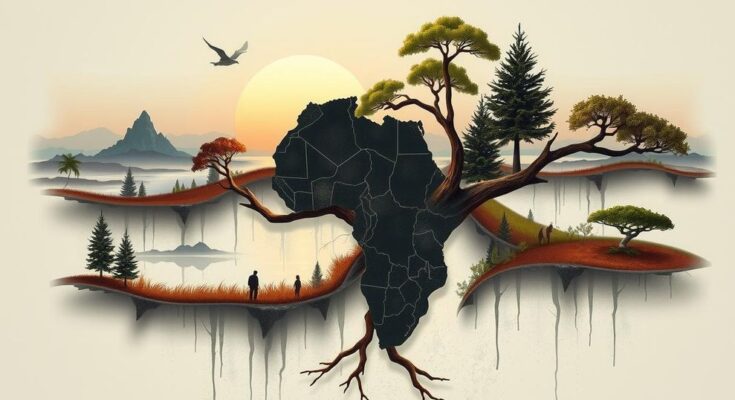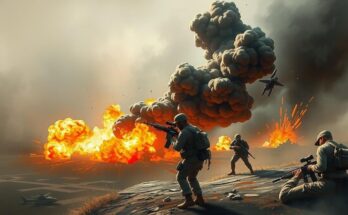South Africa and Rwanda’s diplomatic relations are strained after South African President Cyril Ramaphosa accused the Rwandan-backed M23 rebel group of killing peacekeepers in the DRC. President Kagame denied these claims and criticized South Africa’s military presence. The ongoing conflict has led to the deaths of South African soldiers and raised questions about the efficacy of their peacekeeping mission in the resource-rich region.
Diplomatic relations between South Africa and Rwanda have deteriorated following accusations from South African President Cyril Ramaphosa against the Rwandan-backed M23 rebel group for killing South African peacekeepers in the Democratic Republic of Congo (DRC). South Africa’s response included a warning that attacks on their troops would be viewed as a “declaration of war.” In turn, Rwandan President Paul Kagame condemned South Africa as part of a “belligerent force” supporting the Congolese government against its citizens, amidst rising conflict in the region.
The recent violence has resulted in the deaths of 13 South African soldiers, raising the stakes of regional instability. South Africa had previously suffered losses in 2022, which highlighted the danger and complexity of military involvement in the DRC, particularly within the volatile eastern region. The relationship between South Africa and Rwanda has been historically fraught, with previous diplomatic spats stemming from attacks on exiled dissidents.
Attempts at reconciliation between the two nations seemed promising after Ramaphosa’s visit to Rwanda commemorated the 30th anniversary of the 1994 genocide. However, the situation has deteriorated once again, particularly since South African troops were deployed in late 2023 as part of the Southern African Development Community’s peacekeeping efforts. The current South African mission primarily aims to counter armed groups like the M23, seeking to stabilize the resource-abundant area.
The diplomatic crisis ignited when Ramaphosa shared on social media that he and Kagame discussed the urgent need for a ceasefire and peace talks among all parties involved. While Ramaphosa emphasized that South African troop deployment was not aggressive, his Defence Minister suggested that military actions warranted a firm warning to the rebels. Kagame met these declarations with accusations of misinformation and emphasized that the Rwandan Defense Force is not to be conflated with militia forces.
Kagame’s assertive remarks indicated a desire for South Africa to withdraw from the DRC. Since its military involvement began in the late 1990s, South Africa’s role has evolved, with economic interests and regional stability playing crucial roles in its engagement. Military analysts noted the lack of modern capabilities hampers South Africa’s effectiveness in the current conflict scenario, making it difficult to provide adequate support for their troops.
Amid the turmoil, the Southern African Development Community must now weigh the ramifications of continuing the South African presence against the risks of troop casualties. Military experts suggest an urgent reassessment of the rationale behind South Africa’s involvement in the DRC is necessary. Ramaphosa’s administration faces challenging decisions about troop safety, risking further loss of lives or experiencing political embarrassment through withdrawal.
The escalating conflict in the DRC has spotlighted the complex dynamics between regional powers, particularly South Africa and Rwanda. Historical tensions have compounded recent diplomatic exchanges, significantly influencing military strategies and humanitarian efforts in the region. South Africa’s longstanding military presence in the DRC, initiated during a tumultuous time following apartheid, has evolved amid changing geopolitical landscapes and economic interests. Understanding the implications of each country’s actions in the DRC is essential for grasping the broader narrative of regional stability and peacekeeping efforts.
In conclusion, the diplomatic strife between South Africa and Rwanda reflects the intricate relationship between military engagement and regional peace efforts in the DRC. With the alarming rate of fatalities among South African troops, the government faces mounting pressure to reassess its involvement. Kagame’s response underscores the divisions on the ground, highlighting the critical importance of resolving misunderstandings and prioritizing peace negotiations. Future actions will significantly impact both nations and the broader stability of the DRC’s eastern regions.
Original Source: www.bbc.co.uk




